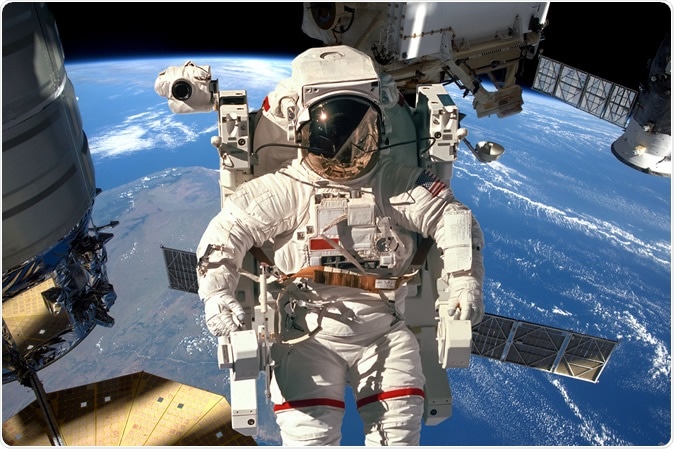Researchers from the University of Texas Medical Branch at Galveston explain that space travellers often face muscle loss that is caused due to reduced gravity during their flight missions in space. They have found that exercise and certain hormones could help prevent this muscle loss. The results of their study were published in the latest issue of the journal PLOS One. The study was titled, “Proteomic investigation of human skeletal muscle before and after 70 days of head down bed rest with or without exercise and testosterone countermeasures.”

Muscle loss for space travelers could be reduced finds study. Image Credit: By Andrey Armyagov / Shutterstock
There has been a growing number of space travelers in the recent past after NASA announced that it would allow private citizens to visit the International Space Station. There are several adverse effects of reduced gravity on the human body say the researchers that most people are unaware of.
Senior author Randall Urban, UTMB chief research officer and professor in the department of internal medicine, in his statement said, “The study has given us the ability to identify biomarkers that predict how susceptible each individual is to muscle function decline and how effectively different exercise and hormone treatments can combat the atrophy.” Muscle atrophy is wasting away and thinning of the muscles due to unused. Senior author Melinda Sheffield-Moore, professor in the Texas T&M department of health and kinesiology and UTMB department of internal medicine, also said, “This new ability may allow scientists to personalize space medicine by designing specific exercise and/or hormone intervention programs for each astronaut on Earth before they embark on a long-term mission to space.”
The team explains that the weight bearing muscles of the body do not work when there is zero gravity. This leads to their atrophy and loss. Long space missions are fraught with problems such as muscle weakness and loss, the team explains. People need to exercise regularly while in space to keep the muscles working. However these in-flight exercises are often not enough to prevent muscle loss, they write. They explain that to study muscle loss due to lack of gravity they used 24 healthy male participants (aged between 27 and 43 years) who were on a 70 day bed rest. The team writes that long term “head down bed rest” could mimic the effects seen on long space flights with periods of reduced gravity.
The participants were divided into three groups. Some of these men were provided with an exercise regimen and also received injections that contained either testosterone or placebo. Another group was provided with no exercise training or supplements for the 70 days. Muscle biopsies were taken from the participants throughout the study to look at the proteins in the muscle tissues.
Thus the participants were divided into three groups;
- Placebo and non-exercise group (8 individuals)
- Placebo plus exercise (8 individuals)
- Testosterone and exercise (8 individuals)
Testosterone enanthate injections were given 100mg intramuscular at weekly intervals for 2 weeks and then stopped for two weeks and again resumed for two weeks. This on and off cycle was continued till the end of the 70 day period.
The exercise regimens included continuous aerobic exercise, resistance exercise (using “horizontal squat device, a horizontal leg press and a prone leg curl machine”), supine aerobic exercise (using “Standalone Zero Gravity Locomotion, Simulator vertical treadmill and a supine cycle ergometer”) and high intensity interval aerobic exercise.
Results revealed that the muscles underwent significant changes due to unused. These changes could be reduced with regular exercise, they noted. Exercise led to a healthy organization of the muscle proteins they noted. Addition of the testosterone supplements added to the muscle growth that was beyond the muscle development seen with exercise alone, the team found.
The team gathered a total of 932 protein spots. Of these 130 spots were found to be altered from normal in terms of “total protein or phosphoprotein levels.” The team writes that reason behind these changes include “calcium signaling, actin cytoskeleton signaling, integrin linked kinase (ILK) signaling, and epithelial adherens junction signalling.” The authors conclude that hormone testosterone may act as a proteome and help rebuild the muscles. They wrote, “...the baseline proteome may aid in the development of personalized countermeasures to mitigate health risks in astronauts as related to loss of muscle mass and function.”
Senior author E. Lichar Dillon, UTMB assistant professor in the department of internal medicine said in a statement, “The unique insights we've gained on muscle proteins during extended bed rest could someday be applied to predict changes to muscle mass/strength in various situations and then develop a personalized program of exercises and hormonal countermeasures.”
The research received funding support from National Aeronautics and Space Administration (NASA), Institute for Translational Sciences at the University of Texas Medical Branch, from the National Center for Advancing Translational Sciences, National Institutes of Health and from the National Cancer Institute.
Source:
- Proteomic investigation of human skeletal muscle before and after 70 days of head down bed rest with or without exercise and testosterone countermeasures, E. Lichar Dillon, Kizhake V. Soman, John E. Wiktorowicz, Ria Sur, Daniel Jupiter, Christopher P. Danesi, Kathleen M. Randolph, Charles R. Gilkison, William J. Durham, Randall J. Urban, Melinda Sheffield-Moore, https://doi.org/10.1371/journal.pone.0217690, https://journals.plos.org/plosone/article?id=10.1371/journal.pone.0217690